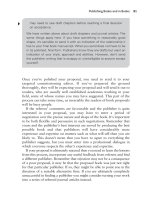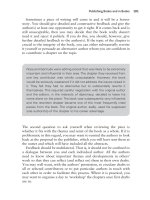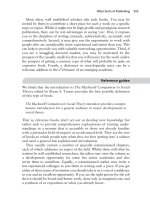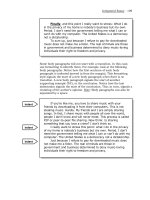Writing for Publication part 13
Bạn đang xem bản rút gọn của tài liệu. Xem và tải ngay bản đầy đủ của tài liệu tại đây (82.58 KB, 10 trang )
111
Most often, well established scholars edit such books. You may be
invited by them to contribute a short piece for such a work on a specific
topic or topics. Whilst it might not be high-profile and prestigious research
publication, there can be real advantages in saying ‘yes’. First, it exposes
you to the discipline of writing concisely, authoritatively, accurately and
comprehensively. Second, it may give you the opportunity to work with
people who are considerably more experienced and senior than you. This
can help to provide you with valuable networking opportunities. Third, if
you are a struggling doctoral student, you may be motivated by the
prospect of the (usually small) fee that you will receive for the work and/or
the prospect of getting a courtesy copy of what will probably be quite an
expensive book. Fourth, a dictionary or encyclopaedia entry can be a
welcome addition to the CV/résumé of an emerging academic.
Reference guides
We think that the introduction to The Blackwell Companion to Social
Theory edited by Bryan S. Turner provides the best possible definition
of this type of book:
The Blackwell Companion to Social Theory intends to provide a compre-
hensive introduction for a general audience to major developments in
social theory.
That is, reference books don’t set out or develop new knowledge but
rather seek to provide comprehensive explanations of existing under-
standings in a manner that is accessible to those not already familiar
with a particular field of enquiry at an advanced level. They are the sort
of books to which people turn when they are first ‘getting into’ a subject
and need a general but sophisticated introduction.
They usually contain a number of specially commissioned chapters,
each of which addresses an aspect of the field. Whilst these will often be
written by well established researchers, the editor may view the volume as
a development opportunity for some less senior academics and also
invite them to contribute. Equally, a commissioned author may invite a
less experienced colleague to join them in writing such a piece. If you get
either of these types of invitation you should take it as a vote of confidence
in you and an excellent opportunity. If you are the right person for the job
then it should be bread-and-butter work, done only at marginal cost, and
a synthesis of or exposition on what you already know.
Other Sorts of Publishing
Boden(3)-06.qxd 10/18/2004 5:47 PM Page 111
Annotated bibliographies
There is an annotated list of suggested Further Reading at the end of
each book in the Academic’s Support Kit that you can use as an example
of this genre. It is, however, rare to see whole books consisting of
annotated bibliographies. The key to a good annotated bibliography is
to ensure that it gives a succinct and accurate account of the books
it describes, says something about their intended readership and
comments briefly on how successful they are. Making a good selection
of books to be annotated is also important, and this means that if you
have been asked to do one, you need to ensure that your selection is fit
for the purpose for which it was intended.
Books for Beginners
There are several series of books intended for people who want to learn
something about a completely new subject in an entertaining way.
One of the best known of these is the … for Beginners series in which
experts in different areas write pithy, witty introductory texts, usually
illustrated with cartoons, about a whole series of issues and ideas. Titles
in the series include topics as far apart as Feminism for Beginners and
Judaism for Beginners. We like these books quite a lot and imagine that
the authors make quite a lot of money, but we have never been asked
to write one ourselves and it is unlikely that you will be either. Unless
you find their style relatively easy to attain, you are probably better off
steering clear of such books.
The digitisation of scholarship
There is much you need to know about the digitisation of scholarship,
particularly around the politics and what they mean not just for you but
also for the public’s access to knowledge.
The changing nature of publishing
We are in the midst of a virtual revolution in scholarly publishing. More
and more scholarly (i.e. peer-refereed) journals are now available
on-line and as well as in hard copy. Some are available on-line only,
Writing for Publication
112
Boden(3)-06.qxd 10/18/2004 5:47 PM Page 112
113
some are open-access and some you have to pay for in one way or
another. At the same time, many of the big print publishing houses are
getting together stables of scholarly journals. Furthermore many
publishing houses have ‘added value’ to such journals by providing a
range of additional services. These include such things as email alerts to
the table of contents of new issues, hyperlinking, author and topic
searches of data bases, hits and download data provision and archives
of material about particular topics.
What does this mean for scholarly practices?
These changes have, inevitably, led to a shift in the practices of
scholarship. Academics actually go to libraries less and less, because we
can access so many journals on-line – both those that our libraries sub-
scribe to and those that are open-access. Indeed, some literature suggests
that if articles are not on-line, readers are becoming less inclined to chase
them up in hard copy. As the editors of Nature Magazine (397, 195–199.
say:
The ability to click from an abstract or citation to the full text of an
article is prompting a shift in the way that journals are used. Scientists
often care less about the journal title than the ability to track down
quickly the full text of articles relevant to their interests. Increasingly,
users view titles as merely part of hyperlinked ‘content databases’
made up of constellations of journal titles. As a result, the competitive
edge of publishers is increasingly coming to depend on their ability to
muster a critical mass of attractive information through a single powerful
and user-friendly interface.
There are many benefits for academics and for journals if they publish
within the publishing stables of the big publishing houses, not the least
being the enhanced international visibility, citability, intellectual
presence and potential impact that such a home brings with it. This is
an especially important issue for researchers outside the USA, Europe
and UK who have to struggle for recognition by UK, European and
US publishers and scholars. The more journals that join these publish-
ing houses, the more they can add value and the more academics are
likely to access their particular ‘databases’ as their major knowledge
sources. This leaves other journals and indeed other publications in
a vulnerable position. Unless they have a strong presence in other
Other Sorts of Publishing
Boden(3)-06.qxd 10/18/2004 5:47 PM Page 113
international abstracting and indexing systems they run the risk of
becoming invisible and residualised in the globalising research scenario.
So what are the issues and concerns?
There are a number of far-reaching implications to think about in
relation to the digitisation of publishing, which revolve around matters
of access to and control of knowledge.
• All publishing houses are taking digital publishing and scholarship
very seriously. Those particularly involved in it include Reed Elsevier,
the Canadian Thomson corporation Wolters Kluwer, Wiley, Springer
and Blackwell. Such companies are putting together huge electronic
archives of intellectual property and are in competitive tension with
each other (and sometimes swallowing each other) seeking to own all
books, archives and research journals. (‘Knowledge Indignation:
Road Rage on the Information Superhighway’, .
au/rn/talks/bbing/stories/s345514.htm, accessed 12/8/2001). Why?
The answer is the potential for profit.
• At this stage university researchers may be able to access various
databases free of charge, but our university libraries, with their dwind-
ling budgets, are being charged considerable amounts – not just for
individual journals but also for bundles of journals, only part of
which may be wanted.
• Of course, the more journals the publishing house has, the more it
will be able to charge. And once it has a monopoly in a particular
field the opportunities for additional charges increase. Perhaps we
will soon see charges by the page or by viewing time. The potential
is there for viewing, sharing and downloading opportunities to be
further restricted and to be increasingly costly.
• If you don’t have access via a library you may not even be able to
access abstracts, and each journal article costs a considerable
amount.
In essence, then, we are seeing the increasing commodification and
privatisation of public knowledge in the digitising and globalising
intellectual bazaar. While distribution may be enhanced, access may
become more and more restricted as it becomes more and more costly.
This is a particularly important issue for poor nations. And, equally, the
control of knowledge slips yet further from the hands of those who
Writing for Publication
114
Boden(3)-06.qxd 10/18/2004 5:47 PM Page 114
115
produce it and from those who fund those who produce it, namely the
taxpayers.
In terms of the issue of public knowledge the following irony arises.
Knowledge is produced by public money in the form of research and of
journal editing and other refereeing services but then locked away in the
profits of private publishing houses. The research published in the
journals is most often funded by government money but certain profits
go to international or global companies. Governments thus pay thrice:
they pay to produce the knowledge, to ‘quality assure’ it and then to
buy it back. Even notions of the knowledge economy are caught on the
horns of competing needs:
• One, to expand the public knowledge base as much as possible.
• And, two, to commercialise that knowledge.
• Three, to keep the benefits of that knowledge in the national interest.
• And, four, to globalise it.
Responses in the academic and policy community
Many research projects, journals and websites and various stakeholders
and interest groups are examining the issues associated with on-line
scholarly publishing. Groups include international information techno-
logy companies, economists, librarians, lawyers and vice-chancellors,
the Association of Research Libraries and the Scholarly Publishing and
Academic Resources Coalition (SPARC). Some examples follow.
• The Public Knowledge Project at the University of British Columbia
is exploring all these issues, and all who publish should regularly
visit their site, which is to be found at />• The dangers of the commercial scenario in the market for science,
technical and medical journals led scientists to be so concerned they
established a lobbying group called the Public Library of Science (see
‘Background Briefing’, Radio National, 12 August 2001) They also
publish open-access journals such as Pubmed, the Journal of Insect
Sciences, eScholarship and Documenta Mathematica.
• Various professional associations, societies and other groups and
individuals continue to publish open-access, peer-refereed and quality-
controlled knowledge on line. They are getting into the pertinent
international indices such as Ingenta and are also seeking to provide
all the value-added features that are now available through the big
Other Sorts of Publishing
Boden(3)-06.qxd 10/18/2004 5:47 PM Page 115









